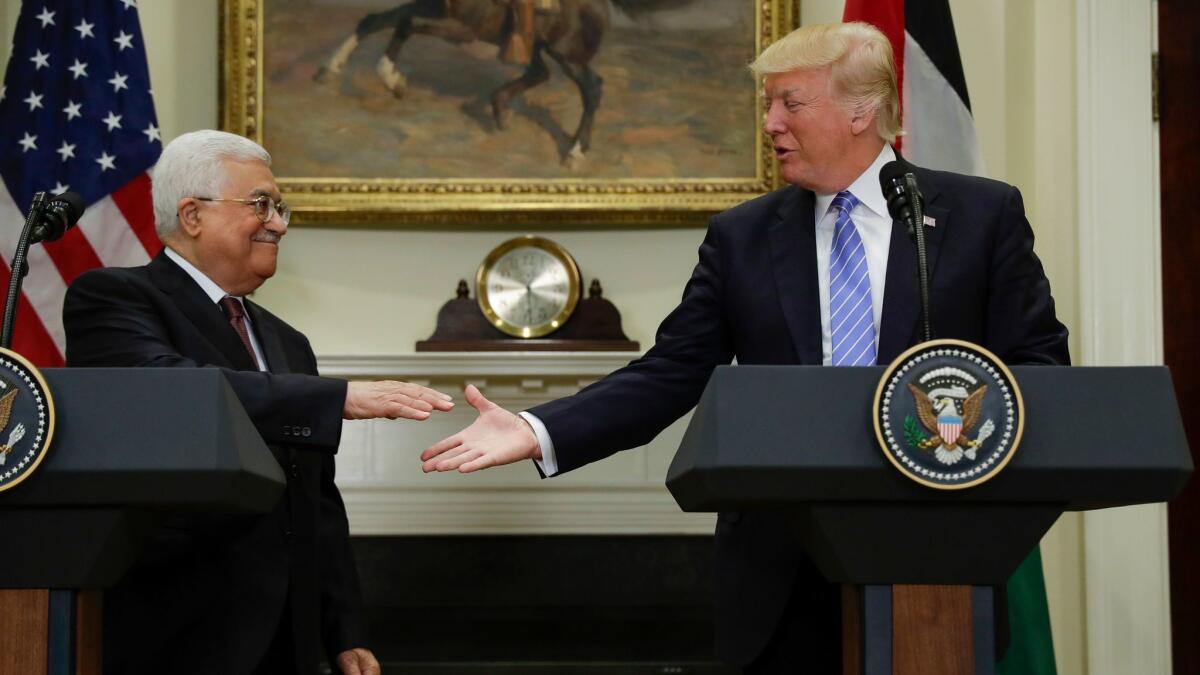Editorial: Trump’s latest arrogant overpromise: peace between Israelis and Palestinians

- Share via
Donald Trump won the presidency thanks to a series of cocky, what-me-worry promises to solve seemingly intractable problems using his supposedly superior art-of-the-deal negotiating skills.
This week, he made another such promise. After meeting with Palestinian President Mahmoud Abbas at the White House, he vowed flippantly to bring the century-old conflict between Israelis and Palestinians to an end, adding that the problem is “something that, I think, is frankly maybe not as difficult as people have thought over the years.”
The monumental arrogance and flat-out ignorance displayed by such an obtuse statement is truly stunning. Virtually all Americans, Israelis and Palestinians, as well as the citizens of every other country on the planet, are in favor of a just, safe, sustainable, mutually beneficial resolution to this conflict, which dates back to the earliest years of the 20th century.
Perhaps his Chauncey Gardiner-type naïvete will give him some bizarre advantages that are not available to more sophisticated students of the conflict.
But no one anywhere believes it will be easy. Just like repealing and replacing Obamacare, which Trump initially said would be “so easy” but finally conceded: “Nobody knew healthcare could be so complicated.”
By all means, Trump should try his hand at Middle East peacemaking. Perhaps his Chauncey Gardiner-type naïvete — and the fact that he is apparently unburdened by any historical or political knowledge of the subject — will give him some bizarre advantages that are not available to more sophisticated students of the conflict.
But for the record, since no one else appears to have told him, here are some of the factors that make this particular conflict knottier and more troublesome than the president seems to realize.
- Any agreement between Palestinians and Israelis must overcome more than 100 years of hatred and mistrust, built on a long history of killings and terror and dispossession and imprisonment and broken promises.
- Israel’s most generous offer ever, made in the final days of the Clinton administration, simply didn’t meet the Palestinian demand for an independent state along the lines that existed before the 1967 war, with East Jerusalem as a capital and a resolution to the ongoing refugee problem. If one side’s best offer doesn’t meet the other side’s minimum requirements, there’s a problem.
- Palestinian and Israeli leaders must wrestle not only with each other, but with hard-liners on their own side who have already proven their willingness to scuttle any agreement that relies (as any agreement must) on compromise.
- Abbas is disliked and mistrusted by his own people, two-thirds of whom said last year that he should resign.
And there are more: How to divide resources, including water. What to do about the millions of Palestinian refugees. How to handle the 1.6 million Palestinians under Hamas rule in the Gaza Strip.
Peace is not impossible. But like virtually all the issues that reach the Oval Office, it is not easy either. It involves sorting out equally valid but irreconcilable claims; making least-bad, zero-sum game choices; relying on judgment calls and subjective political calculations. It will require a president to be tough, even-handed, imaginative and realistic at the same time.
Is Donald Trump up for it? His glib, uninformed pronouncements are not encouraging.
Follow the Opinion section on Twitter @latimesopinion and Facebook
More to Read
A cure for the common opinion
Get thought-provoking perspectives with our weekly newsletter.
You may occasionally receive promotional content from the Los Angeles Times.









